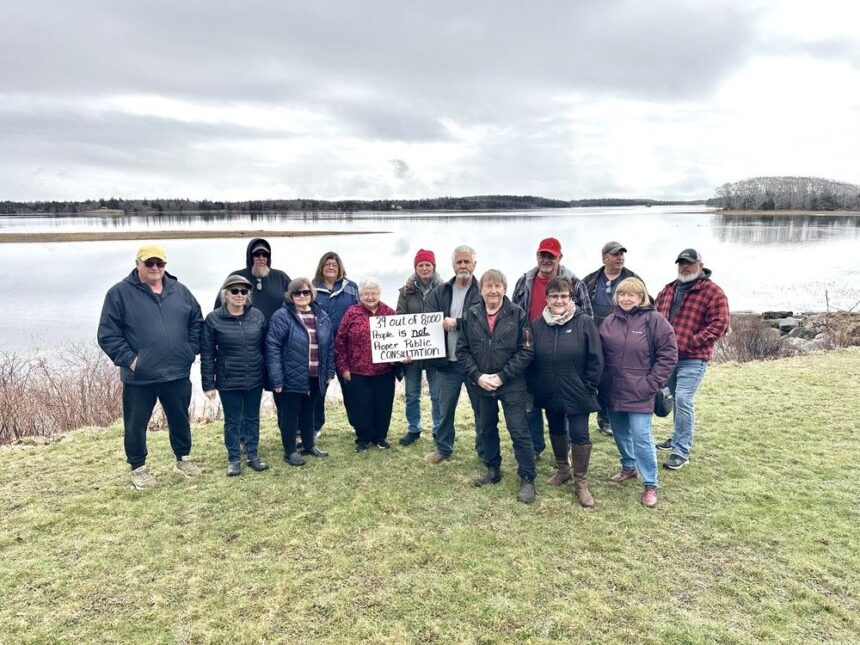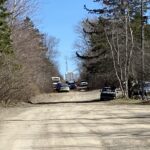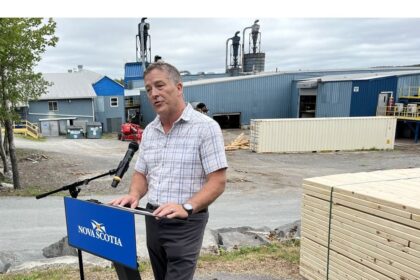Municipality says it is taking the brunt of criticism over a process that is regulated by the provincePublished Apr 21, 2025 • Last updated 8 hours ago • 15 minute readA group of residents in the Municipality of Argyle, concerned with they call a lack of proper public consultation in the setting up of an Aquaculture Development Area, worry waterways close to people’s homes. like this one will be, will be overrun with oyster farm cages. TINA COMEAUIt’s been a rocky year since a new approach to developing aquaculture – in particular oyster farming – in the Municipality of Argyle was announced by the province.Over the past year a group of residents concerned by the process continues to turn up the heat for a do-over, saying they feel the public was largely left out in the cold when it came to consultation as the process was unfolding.THIS CONTENT IS RESERVED FOR SUBSCRIBERS ONLY.Subscribe now to access this story and more:Unlimited access to the website and appExclusive access to premium content, newsletters and podcastsFull access to the e-Edition app, an electronic replica of the print edition that you can share, download and comment onEnjoy insights and behind-the-scenes analysis from our award-winning journalistsSupport local journalists and the next generation of journalistsSUBSCRIBE TO UNLOCK MORE ARTICLES.Subscribe or sign in to your account to continue your reading experience.Unlimited access to the website and appExclusive access to premium content, newsletters and podcastsFull access to the e-Edition app, an electronic replica of the print edition that you can share, download and comment onEnjoy insights and behind-the-scenes analysis from our award-winning journalistsSupport local journalists and the next generation of journalistsRegister to unlock more articles.Create an account or sign in to continue your reading experience.Access additional stories every monthShare your thoughts and join the conversation in our commenting communityGet email updates from your favourite authorsSign In or Create an AccountorArticle contentAt issue is the ADA – an Aquaculture Development Area.The ADA is a planning process that helps to pre-assess data and information to proactively identify possible aquaculture sites, the province says. Licence applications within an ADA still require regulatory approval.The province has said there will be no do-over of the initial ADA public consultation. It says it is satisfied with the level of public consultation and engagement that was carried out by the Municipality of Argyle on its behalf, calling it “comprehensive, thorough and well-documented.”“My department won’t be redoing the public engagement process that took place prior to the creation of the ADA,” wrote Nova Scotia Fisheries and Aquaculture Minister Kent Smith in an April 3, 2025 letter.“We will continue to process applications received through the initial call for proposals made on April 15, 2024, which will include a 30-day public comment period,” the minister said. Six of the 53 identified potential sites were part of that call for proposals.Article content Kent Smith, Minister of Fisheries and Aquaculture, speaks during the 2024 ADA announcement at the Municipality of the District of Argyle office in Tusket. FILE PHOTO Photo by Tina Comeau /COMMUNICATIONS NOVA SCOTIASmith says the province has committed that it will not be announcing any additional calls for proposals on the remaining 47 locations until the first applications are processed and “we have had an opportunity to meet with the Municipality of the District of Argyle to identify opportunities for further communication and information for the community.”“This does not mean a redo of the ADA process,” he again states in the letter.But a redo is what the residents want.NOT IMPRESSEDDale Pothier lives in Lower Eel Brook. The back side of her property already looks onto an oyster farm to the left. Now there’s a chance such operations could span across her family’s view.She says she only learned of the ADA when it was announced by the province in April 2024. It came as a big surprise. Since then she and others have been pushing for changes and information.“We couldn’t get any information from the council. They said everything was done. Done deal. We don’t accept that. That’s not right.”Article contentThe residents’ opinions differ from the province when it comes to the public engagement.The province and municipality have said there was ample consultation opportunities, although last summer, amid complaints about the process, the municipality did concede there is always room for improvement when it comes to keeping residents informed of things that are happening.The residents critical of the ADA process strongly disagree that the consultation was suitable. They say things like pop-up sessions at Carl’s Store in Tusket shouldn’t have been considered proper consultation.“That’s almost a joke,” says Pothier. “I’d like to see a redo of the whole thing and done properly.”Pothier loves her property.“We have a little cottage at the end of our property on the water. It’s completely peaceful. There are geese. There’s ducks,” she says, worrying about the future of this tranquility.She and others feel transparency has been lacking throughout the process.Article contentShe says they are not against oyster farming, but they’re not in favour of chosen sites being so close to people’s properties. An aquaculture site in the Municipality District of Argyle in Nova Scotia. CONTRIBUTED / CENTRE FOR MARINE AQUACUTURE RESEACH Photo by Nicole Sullivan /ContributedTHEN AND NOWIn February 2020 the Department of Fisheries and Aquaculture and the Municipality of Argyle signed a memorandum of understanding to develop the ADA. The municipality says the ADA was the province’s concept.Years of work – led by the province in partnership with the municipality – went into identifying areas for growing shellfish and marine plants. The main role of the municipality was to lead the engagement with industry, stakeholders and the public.In an announcement on April 15, 2024, the province said 53 sites had been chosen as part of the ADA.When the process had begun, an initial area of 23,000 hectares had been the starting point. That was narrowed down to the final 53 sites that span 784 hectares.The municipality says the province finalized the sites and that the municipality only found out where the sites were when the province made its public announcement.Article contentIn that 2024 announcement, the department referred to these as ‘pre-approved’ sites in its media release, although the municipality feels they’re better described as pre-assessed, since ‘pre-approved’ suggests things are a done deal. Companies and individuals still have to go through a lease application process with the province, it says.Still, the entire ADA process has left a lot to be desired by residents who oppose it. Residents in the Municipality of Argyle concerned with an Aquaculture Development Agreement process feel public consultation from the get-go was lacking and should be done again. TINA COMEAUArea resident Joanne Tulk loves to swim in the waters of the municipality. She calls the ADA process “disingenuous.”She disagrees with the assertion that there was ample public consultation. She doesn’t feel there were proper efforts undertaken to ensure the wider public’s voice was heard – especially the voices of those who could be directly impacted.“This is not about us being anti-aquaculture. We recognize it’s a very important part of Nova Scotia. What we are against is conflicts of interest and lack of consultation, and then going, ‘no, no, no’ we can’t hear you,” Tulk says.Article contentShe says it’s frustrating. She feels there should have been direct municipality-led consultation with people living in impacted areas where locations for leases were being assessed and considered.“Whether they were suggested by the industry or not, there should have been consultation with the people who live in the area who are constituents of this municipality,” she says, saying of course it makes sense to those within the industry to want to have easy and convenient access when it comes to lease locations.“But that’s not taking into account the other people involved. As a compromise, it would be better if we moved (sites),” says Tulk. “We’re not against oyster fishermen. We’re against the process to identify these locations. We were not given the opportunity of having meaningful input and to have a balanced view around the table.”Recommended from Editorial Waterfront property owners in Municipality of Argyle unhappy with pre-approved aquaculture site process Shellfish, sea plant farms information lacking, Municipality of Argyle concedes Six sites in Lobster Bay and Pubnico Harbour pre-approved for aquaculture development Article contentOn this particular day, Pothier, Tulk and several other residents have gathered in the yard of a local resident whose home is located off the Rocco Point Road.The view looking over the water is beautiful.Off in the distance they point to an existing oyster farm location. The homeowner worries cages will be coming his way and that when he looks out on the water it’s all he’ll see.Other residents share this concern, both for him and for themselves. They fear it will interfere with their enjoyment of the waterways, particularly things like boating.Mike Scott is among the residents speaking out against the ADA process.“One of the biggest problems we’re seeing is the public consultation process, the conflicts of interests, and the way that the municipality is blocking the residents from voicing their opinion,” Scott says. He adds there have been countless times when councillors have not been replying to constituent’s emails.He says people’s frustration, anger and persistence stems back to what they feel was the initial lack of public consultation. He says he and other residents felt blindsided when the provincial government announced the 53 ADA sites.Article content“We just don’t want them directly in our backyard. It affects our property values,” says Scott, and it will also impact enjoyment of their surroundings. Municipality of Argyle resident Mike Scott holds a map of where some of the potential ADA sites are located. TINA COMEAUScott says councillors didn’t hold individual town hall meetings with their residents to explain the process or to gather input. He also says a stakeholders committee was lacking representation from residents. He feels the entire process was aimed at shutting out the public from voicing their opinions.He and other residents feel transparency has been lacking. Some have gone the route of FOIPOP (Freedom of Information and Protection of Privacy) applications, requesting email exchanges relating to the ADA process.Scott says a FOIPOP cost he was quoted for an application was extremely high. He received a first cost quote of $6,000. From there the quote got significantly more expensive. He says residents have felt the high fees have been meant to dissuade them from filling FOIPOP applications. Some residents have filled complaints.Article contentABOUT FOIPOPAt an April 10 Argyle Municipal Council meeting, FOIPOP was an agenda item. Warden Nicole Albright placed it on the agenda saying that council is getting a lot of questions from the public surrounding FOIPOP. She said it’s something somewhat new to the municipality since in the past it hasn’t received many requests.It was explained that while part of the process is about freedom of information, another part speaks to protection of privacy and sensitive details. Because the two go hand-in-hand, it can make the process more cumbersome and time consuming, it was said. Something considered private may be as simple as a person’s email address, or it may be more complicated.The first step is to determine how much work will be involved in an application, council was told.“There’s always a $5 fee for the initial request,” explained municipal CAO Alain Muise. “Depending on how complex that request is, it could stay there. Or it could be a lot larger.”Article contentEvery citizen gets two hours of free FOIPOP service from a municipality, he said.“The work around this, it’s not just printing emails,” said Muise during the meeting, explaining it also involves redactions to ensure private information about a person is not released, and ensuring that supplied material meets the request criteria. Up until two or so months ago, the work was done by staff. Now the municipality uses a third party.“Though it’s a lot more expensive, it’s helped us tremendously because the experience is there, more so than it would be internally,” said Muise. The municipality says it also has the right (and it has been doing this) to transmit emails in a FOIPOP search result to a third party before the application is finalized to ensure something private that should not be disclosed, isn’t. Argyle Deputy Warden Ted Saulnier and Warden Nicole Albright listen as Argyle Municipal CAO Alain Muise discusses FOIPOP to council during an April 10 meeting. SCREENSHOT FROM LIVE STREAM.ALL FOIPOPs RELATE TO ADAFrom the end of June to the date of the April council meeting, there had been around 18 FOIOP requests, some of which remain outstanding. All requests have been related to the ADA.Article contentThe municipality posts the FOIPOP request results on its website, but does not disclose the name of the person who made the request. The municipality said during the meeting it is working to speed up the FOIPOP process so applicants can get information faster.There is the ability for an applicant to request that a FOIPOP cost be waived. If it is, the cost is picked up by the taxpayers. The true hourly cost of FOIPOP applications is also not charged to the applicant it was said during the discussion around the table.“The rate that’s charged is $30 an hour, so it doesn’t matter what we pay for that. The applicant will pay $30 an hour. So if it costs us $140 an hour, which it does, the only amount that would be paid by the resident in question would be $30,” Muise told council.Some of the council discussion focused on the cost aspect, suggesting the applications could negatively impact the municipality’s budget. The budget, in turn, can impact tax rates.It was stated during the April 10 meeting that the impact on the budget is still a moving target because the municipality doesn’t know how many FOIPOP applications will come in. The municipality noted this is the first year it will budget specifically for FOIPOP request costs. Muise said the cost of FOIPOP has been between $60,000 to $70,000 to the end of March. Muise said some of this is an additional cost, but some of it would have been a cost regardless.Article content“It’s hard to pinpoint a number on that, but what you can say for sure is that somebody working on that was not working on something else that maybe a priority of the administration or of council,” he said.Members of the group that calls itself the Association for Responsible Aquaculture took strong issue with the council FOIPOP discussion, notably the discussion on budget implications. They felt some around the council table were placing blame on people making FOIPOP requests and suggesting impacts on the budget would be their fault. They argue if council was more transparent, the requests wouldn’t be needed.The municipality, meanwhile, said during that April 10 meeting discussion that it is looking at ways to reduce costs associated with FOIPOP, both for itself and applications.‘IT’S BEEN HARD’The ongoing situation hasn’t been easy for the municipality it says. It has been subject to allegations and accusations concerning the integrity of the ADA process. The words ‘rigged’ and ‘cheating’ have been used. The Association for Responsible Aquaculture outlines much of this on its Facebook page.Article content“There have been several allegations made against the municipality that are false,” said Warden Nicole Albright in an interview. “I realize that we haven’t said a whole lot. I want people to understand that the allegations are false.”Still, the municipality says in the interest of transparency, the allegations being made and complaints coming to the municipality are being forwarded to the province for third-party investigation. The Municipality of Argyle has been fielding questions, concerns, allegations and accusations when it comes to an Aquaculture Development Area process. TINA COMEAUAlbright says the municipality has heard from residents opposed to the ADA, but also from those who support it.She says the municipality went into the ADA with the province with good intentions. The region relies heavily on the fishery, especially the lobster fishery. For decades there has also been oyster farming happening in the municipality. The municipality sees economic and employment growth potential for oysters and sugar kelp.It and the province says more people may be willing to invest in these industries if the process is simplified, which in turn can create more jobs.Article content“You want to make sure that people stay here and people are able to find jobs here,” says Albright. “We know that fishing, 100 per cent, is the backbone of our community. But the sea is a big resource. How are other ways that we can use the sea to drive jobs? To grow our economy?”The ADA is, however, a provincial initiative, she notes, stressing the municipality is not the one leading the charge.She says the municipality has passed along people’s concerns to the province, including the fact that people would like to see consultation happen again. But the province hasn’t budged.At a March council meeting, Coun. Malcolm Madden raised the issue again saying he believed public consultation with impacted residents did not happen as it should have.He proposed a motion that council send a letter to the province asking it to pause the awarding of leases to all 53 sites until proper public consultation is completed.His motion, however, did not get a seconder from anyone on council.Article contentAt that same March council meeting, a point of order was raised from the spectator gallery concerning Warden Albright, saying she should recuse herself from the table because her son works for an oyster operation and she is therefore in a conflict of interest. He started working there in September 2024.Albright explained during the meeting that she had sought advice from the municipality’s solicitor and her municipal advisor on whether she was in a conflict. She was told she wasn’t. If she had been, she certainly would have stepped away from the table she says. Nicole Albright holds her hands on her chain of office after being chosen by Argyle council to serve as warden of the Municipality of Argyle. She becomes the first woman to hold this position. Tina Comeau Photo by . /.Albright wishes at that March meeting, however, that she had explained things a bit better.She says she was told she is not in a conflict because the municipality has zero decision-making power when it comes to ADAs. The decision-making responsibility lies completely with the province.“Because the decisions were not made at the municipal level, that is why I am not in a conflict of interest,” she says. “The ADA is a completely provincial mandate. All the decisions were and are made by the province. We had zero decision-making power. We didn’t have any power selecting the sites.”Article contentAt another council meeting that followed, Albright did declare a conflict due to her husband’s employment with an organization. She says that was different because in that case council did have decision-making powers so she removed herself from the table.SHOULD THE PROVINCE STEP UP MORE?Because it can’t make decisions about the ADA, the municipality feels people’s anger and concerns may be somewhat misdirected and that people should be addressing the province more than they seem to be. The municipality says the ADA process is regulated by the province and the province makes the decisions concerning it.The province could hold a public meeting to allow residents a chance to have their say and ask questions about the ADA and the process, the municipality says. But it hasn’t.“We have had a lot of conversations around that because, to be honest, we feel like sometimes we’ve taken the brunt of a lot of what’s going on for something that really we’ve had not a lot of control in,” Albright says.Article contentThe municipality says a goal of the ADA process was to identify where in the municipality you could grow oysters, and where you could not.Concerned residents say the process should also include where you should not. Residents in the Municipality of Argyle opposed to an Aquaculture Development Area process say they don’t want to look out the windows of their homes and see oyster cages when there are other sites away from people’s homes that could be used instead. TINA COMEAUEIGHT FACTORSThere is a list of eight factors the Department of Fisheries and Aquaculture says it must consider when it comes to applications within an ADA. These are:• the optimum use of marine resources;• the contribution of the proposed operation to community and provincial economic development;• fishery activities in public waters surrounding the proposed aquaculture operations;• the oceanographic and biophysical characteristics of the public waters surrounding the proposed operation;• other users of the public waters surrounding the proposed aquacultural operation;• the public right of navigation;• the sustainability of wild salmon;• and, the number and productivity of other aquaculture sites in public waters surrounding the proposed aquacultural operation.Article contentThere is no criteria regarding consideration of proximity to homes.“I can appreciate that for a resident, some really don’t want that (in their backyard), they don’t like the looks of it. Whereas others will tell me it doesn’t bother them,” says Albright. “When I asked the province, ‘Why is is not a ninth factor?’ they said because not everybody sees things the same way. You can’t quantify that.”Says Albright, “We get criticism for not listening and for pushing things off to the province. But it’s their baby. We can’t change that.”The municipality and the province both point out that even before or without the ADA, any company or individual could have applied for permission to locate an oyster farm in any of the sites that are now part of the ADA.Albright says the municipality did what it could to make people feel engaged in the ADA process.“The province gave us the protocol, told us what to do … but some people still didn’t see themselves in the process,” she says. “Even though we advertised. Even though we had public meetings … they still didn’t understand that it was linked to them.”Article contentOther residents, she says, have told councillors they made comments and raised concerns during the process but feel the province did not listen to what they had to say.Albright says the ongoing issue and finger pointing at the municipality is taking a heavy toll on council and on council members individually.“It’s tough when your character is questioned. When your integrity is questioned. Because I feel like I’m honest. I feel like I’ve come into this for the right reasons,” she says. “It’s been hard.”But the residents concerned with the ADA say it is hard on them too. They feel as if they have no control over what could happen adjacent to their properties. And they don’t trust the ADA process.They say their voices may not have been heard during the consultation process, but they’re making sure their voices are being heard now.Article content
Concerned residents want a do-over of aquaculture process in Municipality of Argyle











